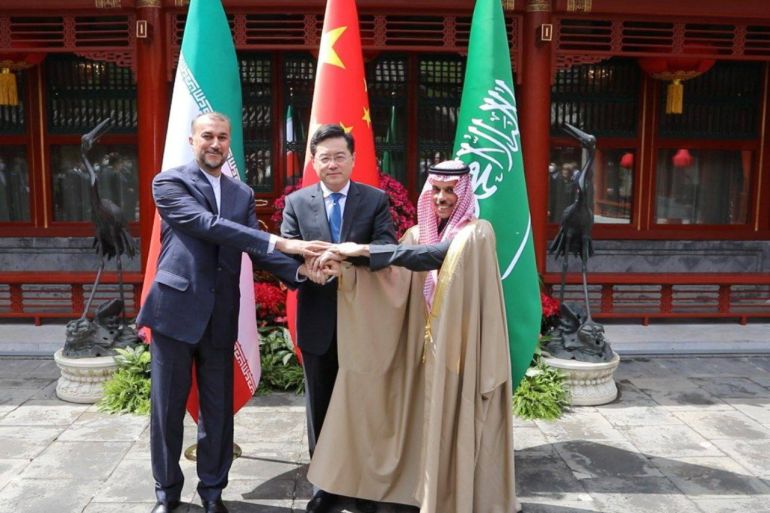Iran, Saudi Arabia take a step closer to repairing ties
The countries’ foreign ministers agree to open embassies, resume official visits and facilitate visas for citizens.

Saudi Arabia and Iran’s foreign ministers have met in Beijing for the first formal gathering since China brokered a deal to restore relations between the top regional powers last month.
Saudi Foreign Minister Prince Faisal bin Farhan Al Saud and his Iranian counterpart, Hossein Amirabdollahian, shook hands in the Chinese capital on Thursday.
Keep reading
list of 2 itemsWhat to expect after Iran, Saudi Arabia agree to restore ties
The officials said they have agreed to follow up on arrangements to reopen their diplomatic missions in their respective countries, to encourage visits of official and private delegations, and to facilitate visas for Iranian and Saudi citizens. They also agreed to discuss resuming flights between them.
“The technical teams will continue coordination to examine the ways of expanding cooperation including the resumption of flights and bilateral visits of official and private sector delegations and facilitating the granting of visas for the citizens of the two countries,” read a joint statement.
Iran’s Amirabdollahian said the meeting with his Saudi counterpart was “positive”. “The emphasis on stability and sustainable security” were among the issues agreed upon, he wrote on Twitter.
After years of hostility, the regional rivals agreed in March to restore ties in a landmark agreement brokered by China – a move that experts say demonstrated Beijing’s increasingly influential role in the region in contrast to the diminishing role of the United States.
Chinese Foreign Ministry spokesperson Mao Ning said on Thursday that Beijing is ready to support both sides in fostering good relations, urging the international community to help the Middle Eastern countries resolve their differences.
“The colonial hegemonic tactics of stirring up contradictions, creating estrangement and division should be rejected by the people all over the world,” she said.
Abas Aslani, a senior fellow at the Center for Middle East Strategic Studies, told Al Jazeera that Iran and Saudi Arabia were previously “mostly focused on rivalry and tensions, but now they are talking about focusing on common ground … stressing cooperation”.
“But on the bilateral level, to what extent they can go ahead depends on how the Saudis act because Iran has been under economic sanctions by the West; that’s why we have to see how they will proceed,” he added, referring to sanctions placed on Iran over its nuclear programme.
Rocky relations
The countries broke formal ties in 2016 after Saudi Arabia executed Shia Muslim leader Nimr al-Nimr and Iranian protesters attacked Saudi diplomatic missions – one in a series of flashpoints between the two longstanding regional rivals.
The kingdom then asked Iranian diplomats to leave within 48 hours while it evacuated its embassy staff from Tehran.
The relationship between the two, which had hit rocky patches on and off for more than 40 years, worsened notably as they staked opposing positions on conflicts including the war in Syria and the war in Yemen, where the Iran-aligned Houthi movement has been fighting a Saudi-backed government after taking over the capital, Sanaa.
For Saudi Arabia, the rapprochement could mean improved security. The kingdom has blamed Iran for arming the Houthis, who launched missile and drone attacks on Saudi Arabian cities and oil facilities.
In 2019, Riyadh blamed an attack on Aramco oil facilities, which knocked out half of its oil output, directly on Iran, which denied those accusations.
Regional power dynamic
The restoration of ties between the two countries comes amid major shifts in the power dynamic of the region.
“They [seem] determined … to expand their cooperation, I think mostly on regional issues and cases including Yemen, Syria, Iraq and Lebanon,” Aslani said.
After the Saudi-Iran rapprochement, Saudi state television reported that Riyadh was discussing the possible resumption of consular services between it and Damascus.
If confirmed, the re-establishment of relations between the kingdom and Syria would mark the most significant step yet in the Arab world to restore ties with Syrian President Bashar al-Assad.
Al-Assad was shunned by many Western and Arab states after his security forces’ use of violence on protesters unleashed a war in 2011.
Saudi Arabia is also working on re-engaging with Turkey after years of tension exacerbated by the brutal killing by Saudi agents in Istanbul of Jamal Khashoggi, a Saudi dissident and Washington Post columnist.
Meanwhile, Iran appointed on Wednesday a new ambassador to the United Arab Emirates. While the two countries had broken ties in 2016, they recently began re-engaging, with the UAE appointing an ambassador to Tehran last year.